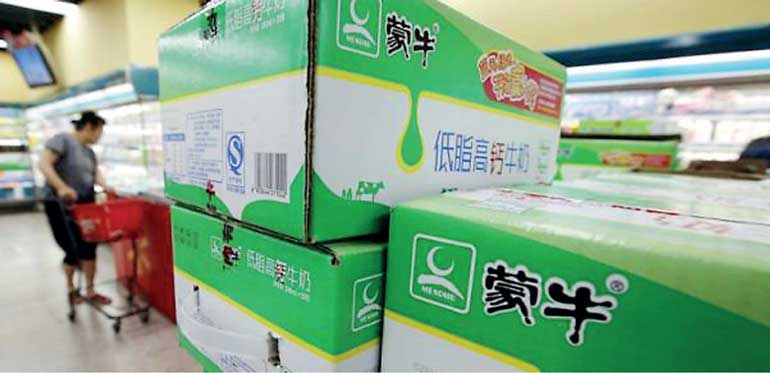Saturday Mar 01, 2025
Saturday Mar 01, 2025
Thursday, 21 December 2017 00:33 - - {{hitsCtrl.values.hits}}

BEIJING/ZURICH (Reuters) - China’s number two dairy company will be the official supplier of drinkable yoghurt and pre-packaged ice cream at next year’s World Cup after signing an agreement with global soccer body FIFA on Wednesday.
China Mengniu Dairy Co become the fourth company from the country to sign a deal with FIFA after Dalian Wanda, Hisense and Vivo.
Chinese firms have increasingly been backing high-profile world sports events, especially in soccer, even though the country’s own team failed to clinch a spot in the tournament scheduled to kick off next June.
FIFA said in a statement that Mengniu would be “the official drinkable yoghurt and pre-packaged ice-cream of the FIFA World Cup and the official milk and powdered milk of the FIFA World Cup for Greater China.”
“Mengniu is one of the biggest dairy producers in the world and is a strong brand in the Chinese market. Growing the game worldwide is one of our key priorities,” said FIFA’s chief commercial officer Philippe Le Floc‘h.
Wanda is a so-called tier one partner, meaning they receive the highest sponsorship rights, including rights to all FIFA competitions and corporate activities up to and including the 2030 FIFA World Cup.
Mengniu, Vivo and Hisense are so-called tier-two partners who have sponsorship rights for the tournament in Russia.
FIFA is trying to recover from the worst corruption scandal in its history and has been struggling to sign up sponsors since several dozen football officials, including several in senior FIFA positions, were indicted in the United States in 2015 on corruption-related charges.
FIFA offers a maximum of 36 sponsorship slots and it still has around half of those open six months before the tournament in Russia.
FIFA needs sponsorship to help reach its target of a $100 million surplus for the four-yearly cycle ending at the 2018 World Cup.
It is also under pressure to increase its revenue after president Gianni Infantino, elected last year, promised to increase payouts to its 211 member federations to develop the sport.
Discover Kapruka, the leading online shopping platform in Sri Lanka, where you can conveniently send Gifts and Flowers to your loved ones for any event including Valentine ’s Day. Explore a wide range of popular Shopping Categories on Kapruka, including Toys, Groceries, Electronics, Birthday Cakes, Fruits, Chocolates, Flower Bouquets, Clothing, Watches, Lingerie, Gift Sets and Jewellery. Also if you’re interested in selling with Kapruka, Partner Central by Kapruka is the best solution to start with. Moreover, through Kapruka Global Shop, you can also enjoy the convenience of purchasing products from renowned platforms like Amazon and eBay and have them delivered to Sri Lanka.
Discover Kapruka, the leading online shopping platform in Sri Lanka, where you can conveniently send Gifts and Flowers to your loved ones for any event including Valentine ’s Day. Explore a wide range of popular Shopping Categories on Kapruka, including Toys, Groceries, Electronics, Birthday Cakes, Fruits, Chocolates, Flower Bouquets, Clothing, Watches, Lingerie, Gift Sets and Jewellery. Also if you’re interested in selling with Kapruka, Partner Central by Kapruka is the best solution to start with. Moreover, through Kapruka Global Shop, you can also enjoy the convenience of purchasing products from renowned platforms like Amazon and eBay and have them delivered to Sri Lanka.